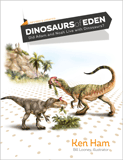News to Note, March 6, 2010
A weekly feature examining news from the biblical viewpoint
Ida unlinked, dinosaur predators and predaters, frozen evolution, and more!
This week:
- Ida unlinked
- Dinosaur predator
- Dinosaur predater
- Fabergés in the making?
- Frozen evolution
- And Don’t Miss . . .
Did you miss it? Catch last week’s News to Note or any other!
1. "Missing Link" Cut Short
Many readers have probably forgotten “Ida,” the fossil primate whose fifteen minutes of media-frenzied fame as a “missing link” was cut short.
2. Diet of Snake Frozen in Time
The location of a snake found “frozen in time” reveals a component of its diet: newly hatched dinosaurs.
3. Dinosaur Ancestors Alive Earlier than Originally Thought
A new fossil discovery tells evolutionists that some of dinosaurs’ supposed ancestors were on the scene ten million years earlier than was thought. What does the find tell creationists?
4. Shell Bits Display Intelligence of Ancient Humans
Bits of shell discovered in South Africa display the intelligence of “ancient” humans.
5. LiveScience: “Polar Bears Evolved Just 150,000 Years Ago”
A genetic study shows that polar bears diverged from brown bears about 150,000 years ago, LiveScience reports.
That conclusion began with the discovery of a polar bear jawbone (estimated at between 110,000 and 130,000 years old) on the Norwegian island of Svalbard six years ago. After its discovery, a team led by the University of Buffalo’s Charlotte Lindqvist drilled into one of the bone’s teeth and recovered mitochondrial DNA, which was then compared to mitchondrial DNA from modern polar bears and brown bears.
Lindqvist explains that “Polar bears actually originated from . . . brown bears. We found that this ancient polar bear is positioned almost directly at the splitting point between polar bears and brown bears—very close to the common ancestor.”
Through the lens of the creation worldview, the recovered bone may actually date from the early stages of the post-Flood Ice Age. If that is the case, only a few hundred years would have passed since the bear kind (a kind encompassing modern polar and brown bears, at least, and probably others) departed the Ark and moved into various ecological niches around the globe. The rapid speciation we observe from such fossils gives us an idea of how a polar bear population could have quickly differentiated itself from brown bears. Just as many modern bear species could have descended from the same bear kind aboard the Ark, all modern species represent the spectrum of genetic diversity in the far fewer kinds aboard Noah’s Ark.
For more information:
6. And Don’t Miss . . .
- Is it only an overzealous Darwinist who would give credit to Charles Darwin for helping predict the recent earthquake in Chile? Actually, ScienceNOW reports that Darwin’s observations from the region after an 1835 earthquake have proven helpful to seismologists. The fact reminds us that Darwin, however controversial, was a committed, though fallible, scientist—not an atheist crusader. And our prayers are with the victims of the Chilean earthquake (which shortened the day—slightly), along with the many still affected by the earthquake in Haiti and those injured by a recent 6.4-magnitude quake in Taiwan.
- In another design innovation inspired by God’s design, researchers at the University of Florida have borrowed from spiders’ body hair to create a material that resists water by using tiny plastic hairs.
- Not only do ants smell in stereo; they also use the ability to create “odor maps” and navigate, scientists report in Animal Behavior. By “learn[ing] the olfactory scenery,” an ant can return directly to home after traveling up to 330 ft (100 m) away looking for food.
- A NASA module on the Indian spacecraft Chandrayaan-1 has detected more water ice on the moon, BBC News reports. Thankfully, it’s one instance of finding water in space that doesn’t come with speculation about finding alien life.
- Arizona State astronomer Paul Davies argues in a new book that humans must broaden our efforts to “hear” from extraterrestrial life. That’s his response to the “eerie silence” after decades of listening for communication from space.
- More research reveals ways in which animal smarts (pigeons’, in this case) may surpass humans’ in selected ways. In an experiment, a group of pigeons performed better than students at correctly responding to the counterintuitive logic of the famous “Monty Hall problem.”
- Is free will just an illusion, as a University of Pennsylvania biologist argues? Of course, if his view is correct, then creationists have no choice when they reject evolution—perhaps not a conclusion he would encourage!
- According to a new decision by a South Australia education board, even Christian schools are effectively banned from teaching a science curriculum that “espouses or reflects the literal interpretation of a religious text in its treatment of either creationism or intelligent design.”
- The Christian Post, Crosswalk.com, and World magazine were among the news sources reporting on Answers in Genesis’s new national campaign and website, iamnotashamed.org. Visit today!
For More Information: Get Answers
Remember, if you see a news story that might merit some attention, let us know about it! (Note: if the story originates from the Associated Press, FOX News, MSNBC, the New York Times, or another major national media outlet, we will most likely have already heard about it.) And thanks to all of our readers who have submitted great news tips to us. If you didn’t catch all the latest News to Know, why not take a look to see what you’ve missed?
(Please note that links will take you directly to the source. Answers in Genesis is not responsible for content on the websites to which we refer. For more information, please see our Privacy Policy.)
Recommended Resources

Answers in Genesis is an apologetics ministry, dedicated to helping Christians defend their faith and proclaim the good news of Jesus Christ.
- Customer Service 800.778.3390
- © 2025 Answers in Genesis






